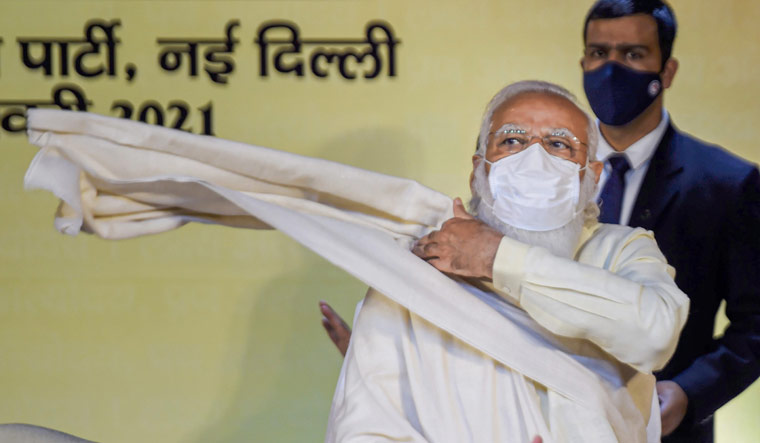Emphasising on reducing government intervention in businesses, Prime Minister Narendra Modi suggested self-regulation, self-attesting and self-certification for industries in order to make them more competitive and improve efficiency.
The government is working at every level to promote the industry such as ease of doing business, reducing the compliance burden, creating multimodal infrastructure to reduce logistics costs and constructing district level export hubs. The government believes that interference in everything creates more problems rather than solutions,” Modi said during a webinar on Production Linked Incentives organised by Niti Aayog and the Department of Industry and International Trade.
“We have to attract cutting edge technology and maximum investment in the sectors related to our core competency,” he said. Modi emphasised the need to make Indian companies and manufacturing being done in India globally competitive and to create global recognition for our production cost, products, quality and efficiency.
The prime minister said the government’s thinking is clear--minimum government, maximum governance and expects zero effect, zero defect.
The prime minister highlighted the steps taken by his government to boost trade and industry in this year’s budget. Referring to measures taken to boost Make in India at different levels, Modi stressed on the need to take a big leap, increase the speed and scale to boost manufacturing. He cited examples from around the world where countries have accelerated the development of the country by increasing their manufacturing capacities.
He said increasing manufacturing capacities would increase employment generation in the country proportionally.
Modi dwelled on the PLI scheme saying the main difference between the earlier schemes and the schemes his government brought was that earlier industrial incentives used to be open-ended, input-based subsidies. But now, they have been made targeted and performance-based through a competitive process.
The prime minister said 13 sectors have been brought under Production-Linked Incentives for the first time. PLI benefits the entire ecosystem associated with the sector. “With PLI in auto and pharma, there will be very less foreign dependence related to auto parts, medical equipment and raw materials of medicines. The energy sector will be modernised in the country with the help of advanced cell batteries, solar PV modules and specialty steel. Similarly, the PLI for the textile and food processing sector will benefit the entire agriculture sector.”
Modi said in this year's budget, a provision of about Rs 2 lakh crore has been made for schemes related to the PLI scheme. An average of 5 per cent of production is given as incentive. This means that PLI schemes will lead to production worth $520 billion in India in the next five years. It is also estimated that sectors for which the PLI scheme has been created will witness doubling of the workforce.
He said PLI-related announcements are being implemented with speed as he recently approved PLI schemes in IT hardware and telecom equipment manufacturing that will lead to tremendous increase in production and domestic value addition. IT hardware is estimated to achieve Rs 3 lakh crore worth production in four years and domestic value addition is expected to rise from current 5-10 per cent to 20-25 per cent in five years.
also read
- IMF raises India's growth projection to 6.8 pc; growth in China likely to slow to 4.6 pc
- Double economy, exports: PM Modi's growth plan for probable 3rd term
- Corporate credit rating upgrades continue to outweigh downgrades
- Here's how Germany surpassed Japan as third largest economy despite shrinking GDP
Similarly, telecom equipment manufacturing will witness an increase of about Rs 2.5 lakh crore in five years. We should be in a position to export Rs 2 lakh crore worth of products from this, Modi said.
In the pharma sector, the prime minister expects more than Rs 15,000 crore investment in the next 5-6 years under PLI leading to Rs 3 lakh crore in pharma sale and export increase worth Rs 2 lakh crore.
The prime minister also remarked that it is a matter of pride that following India's proposal, the United Nations has declared the year 2023 as the International Year of Millets. He said more than 70 countries came to support India's proposal and unanimously accepted it in the UN General Assembly. He said this is also a big opportunity for our farmers. He urged to start a worldwide campaign in 2023 on the nutritional potential of millets or coarse grains to protect people from getting sick.
He said that the demand for millets at home and abroad will increase rapidly with the announcement of the International Year of Millets and this will greatly benefit our farmers. He also urged the agriculture and food processing sector to take full advantage of this opportunity.





